


How often do you hit the snooze button in the morning? If your answer is very often, you likely struggle to wake up early. The most common reason for this is not sleeping early. Luckily, you can train yourself to sleep earlier with good sleep hygiene practices.
In this article, we’ll cover 7 tips and strategies to help you fix and adjust your current sleep schedule.
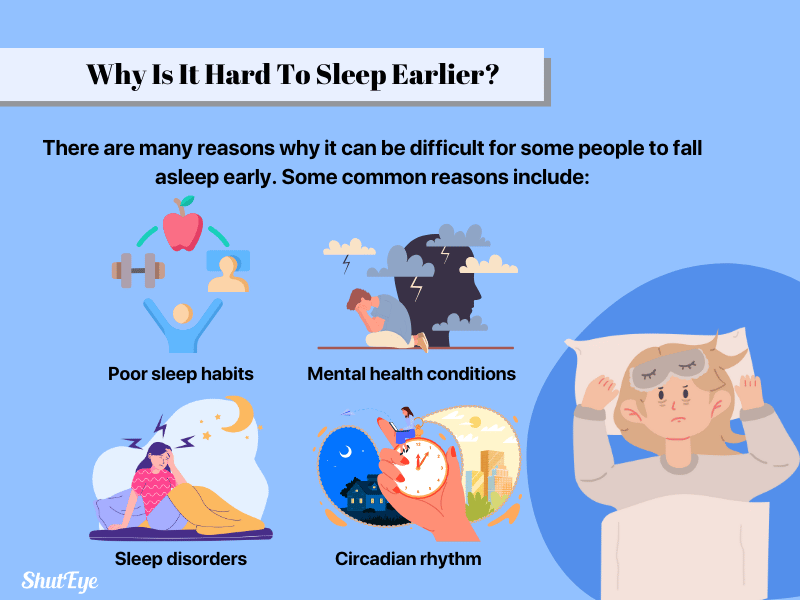
There are many reasons why it can be difficult for some people to fall asleep early. Some common ones include poor sleep habits, mental health conditions, sleep disorders, life circumstances, our body’s natural circadian rhythm, and the use of stimulants.
In some cases, it could simply be a result of bedtime procrastination. For instance, you might plan to go to bed right after watching an episode of your favorite TV series, but instead, you get caught up in binge-watching and end up sleeping hours later than intended [1].
Some of the benefits of going to sleep hours earlier are [2]:
If you have been struggling to stick to an early bedtime, here are some tips to help you gradually shift your sleep time and ensure you still get enough sleep at night.
Establishing a consistent sleep schedule helps to maintain the body’s internal clock, helping you to fall asleep and wake up more easily [3]. You can do so by making it a habit to go to sleep and wake up at the same time every day, including weekends.
Consistency is an important aspect when it comes to improving your sleep quality and maintaining it.
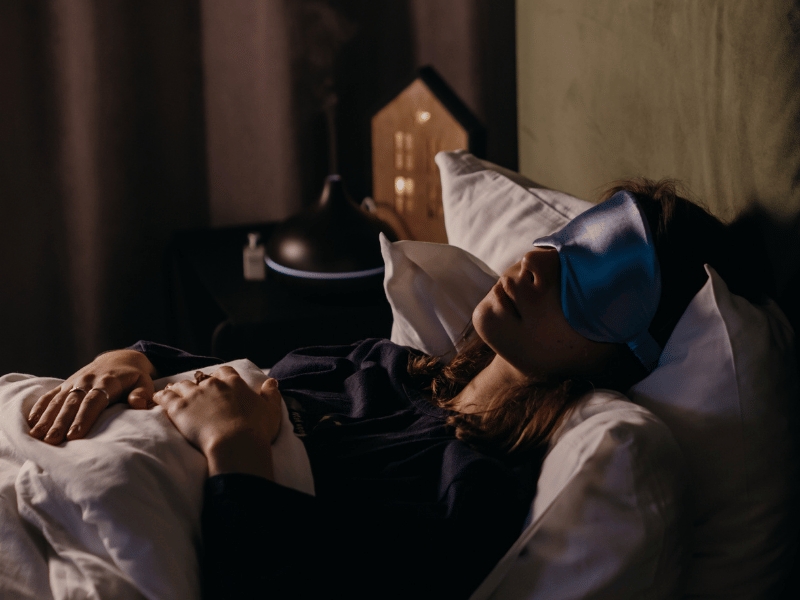
Creating a relaxing bedtime routine in the evenings can help you to relax the mind and fall asleep faster at night. Taking a warm shower, reading a book, listening to calming music for sleep or meditating are some examples of relaxing activities you can do.
You can find some sleep sounds and guided meditation audios within the ShutEye® app to help you get started on your evening routine.
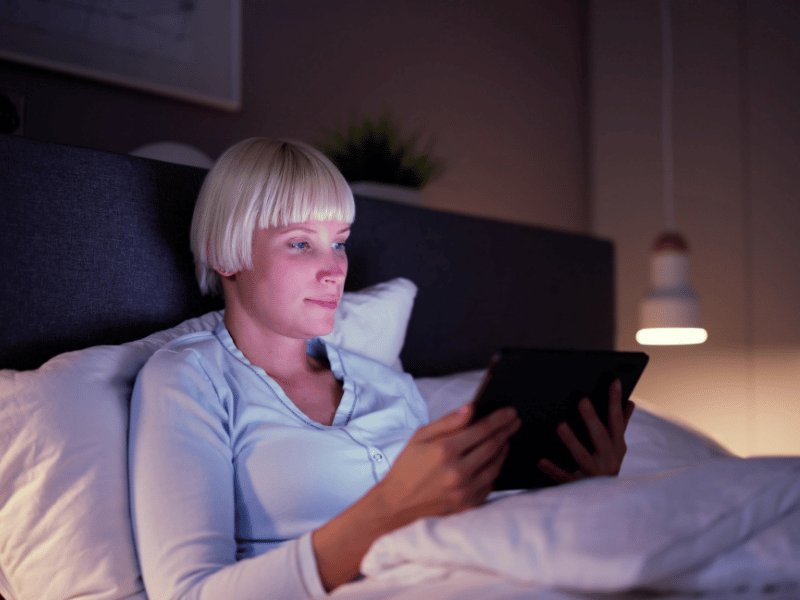
It’s important to minimize your exposure to blue light, especially before bedtime. Electronic devices emit blue light which suppresses the production of melatonin, the hormone that regulates your sleep-wake cycle. This reduced production will disrupt sleep.
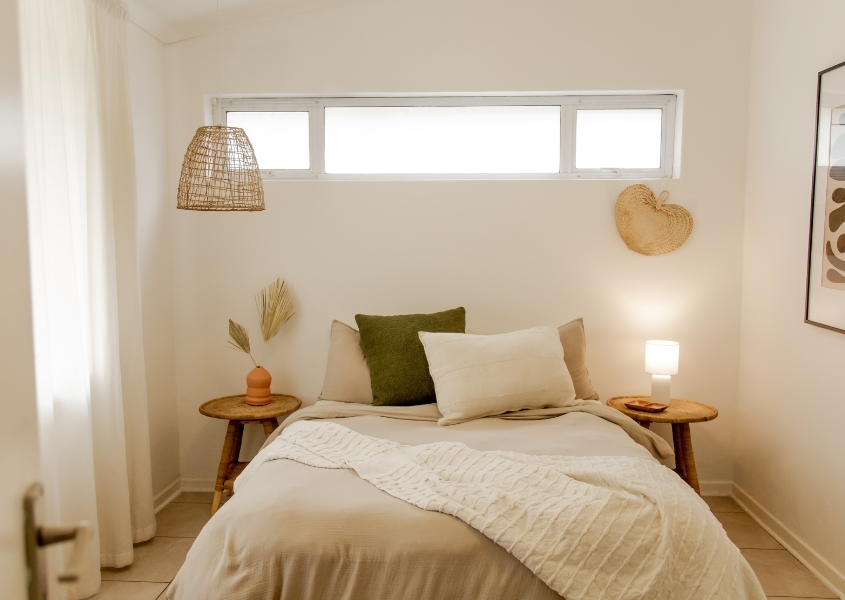
It’s also important to ensure that your bedroom is conducive to optimal sleep conditions by creating a comfortable and calming sleep environment. Here are some tips to help you create a better bedroom environment for sleep:

When trying to go to bed early and improve your sleep quality, it’s important to be mindful of what you consume. Stimulants like caffeine can interfere with your ability to fall asleep, so it’s best to limit your consumption in the afternoon and evening. Remember that the alerting effects of caffeine can last up to six hours.
Additionally, substances like nicotine and alcohol should be avoided as they can disrupt your sleep patterns.

If you want to improve your sleep quality and go to bed earlier, incorporating exercise into your daily routine is crucial. Exercise has a positive impact on sleep quality and can help regulate sleep patterns, making it easier to fall asleep and get better sleep throughout the night.
Here are some tips to help you incorporate exercise into your routine to sleep better:
It’s important to note that you should carry out intense exercises during the day and not before going to bed. Strenuous exercise tends to stimulate your nervous system and raise your heart rate which can make it harder to fall asleep
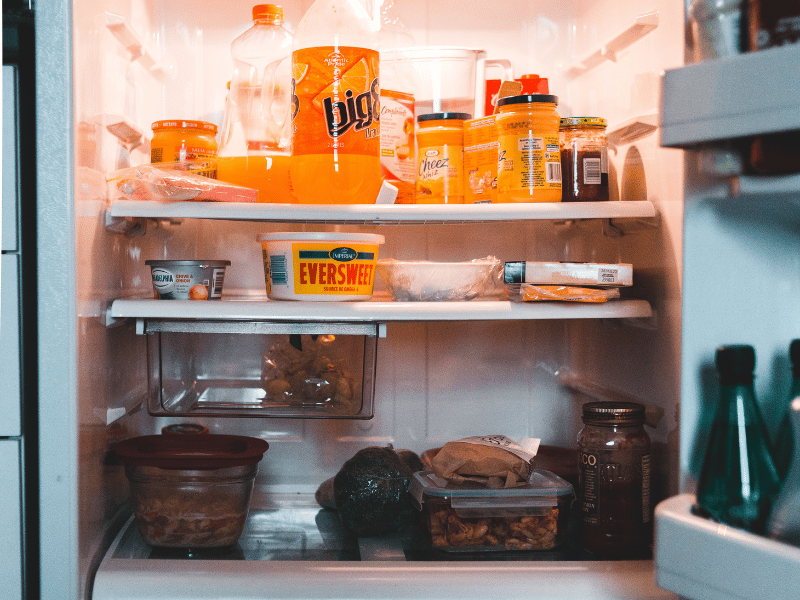
Avoiding heavy meals before bed is important for ensuring a restful sleep at night. Consuming large, heavy, or high-fat-containing meals before bed can easily cause indigestion and heartburn, affecting the quality of your sleep [5].
It’s best to avoid eating heavy foods at least 2 to 3 hours before bedtime and opt for light and healthy snacks such as a banana or yogurt instead.
All in all, shifting your sleep schedule and going to bed earlier is not all that complicated. Focus on practicing good sleep hygiene and making gradual changes to your lifestyle. Doing so will help you to feel less tired and ready to take on the morning!
If you find it hard to make such changes by yourself, don’t worry! ShutEye® is a comprehensive sleep-tracking app that helps you to gradually improve your sleep habits with expert-recommended tips for a good night’s sleep. Try it for free today!
Harvard Medical School (2024) Adopt Good Sleep Habits [online]. Available at: https://sleep.hms.harvard.edu/education-training/public-education/sleep-and-health-education-program/sleep-health-education-93
Health Hub (2021) Can’t Sleep at Night? Eat Right to Sleep Tight [online]. Available at: https://www.healthhub.sg/live-healthy/eat-right-sleep-tight
Reva University (2022) 5 Reasons Why You Should Go to Sleep Early Tonight [online]. Available at: https://www.reva.edu.in/blog/5-reasons-why-you-should-go-to-sleep-early-tonight
Shatz, I. (2024) Bedtime Procrastination: Why People Procrastinate on Going to Bed and How to Stop [online]. Available at: https://solvingprocrastination.com/bedtime-procrastination/